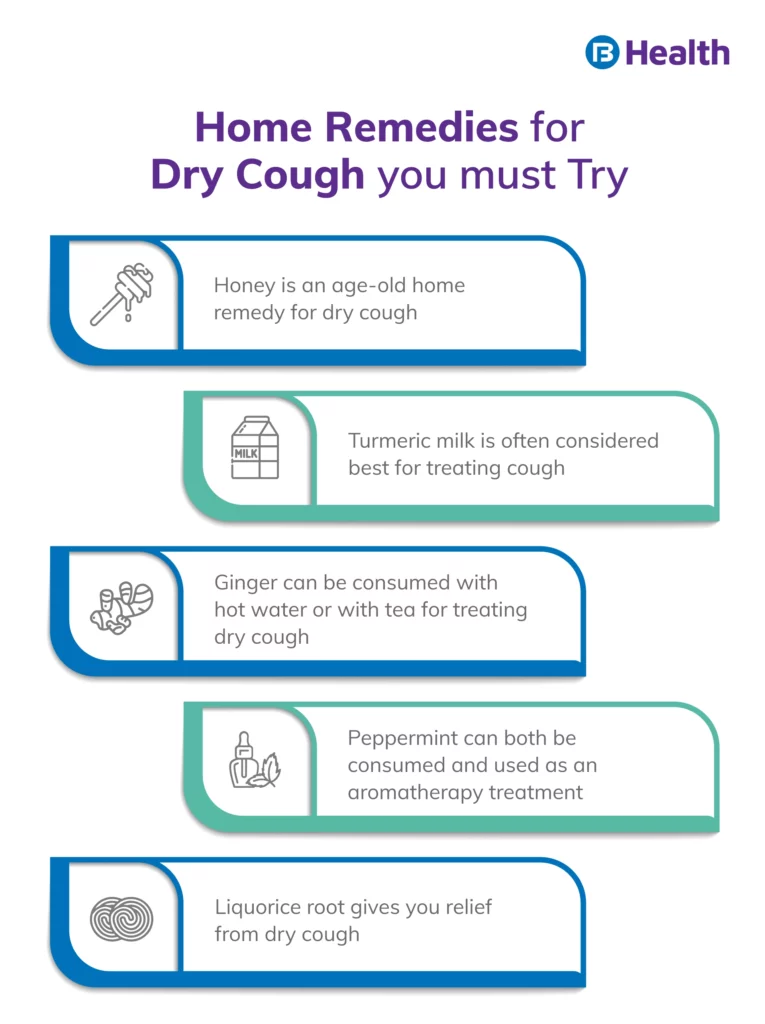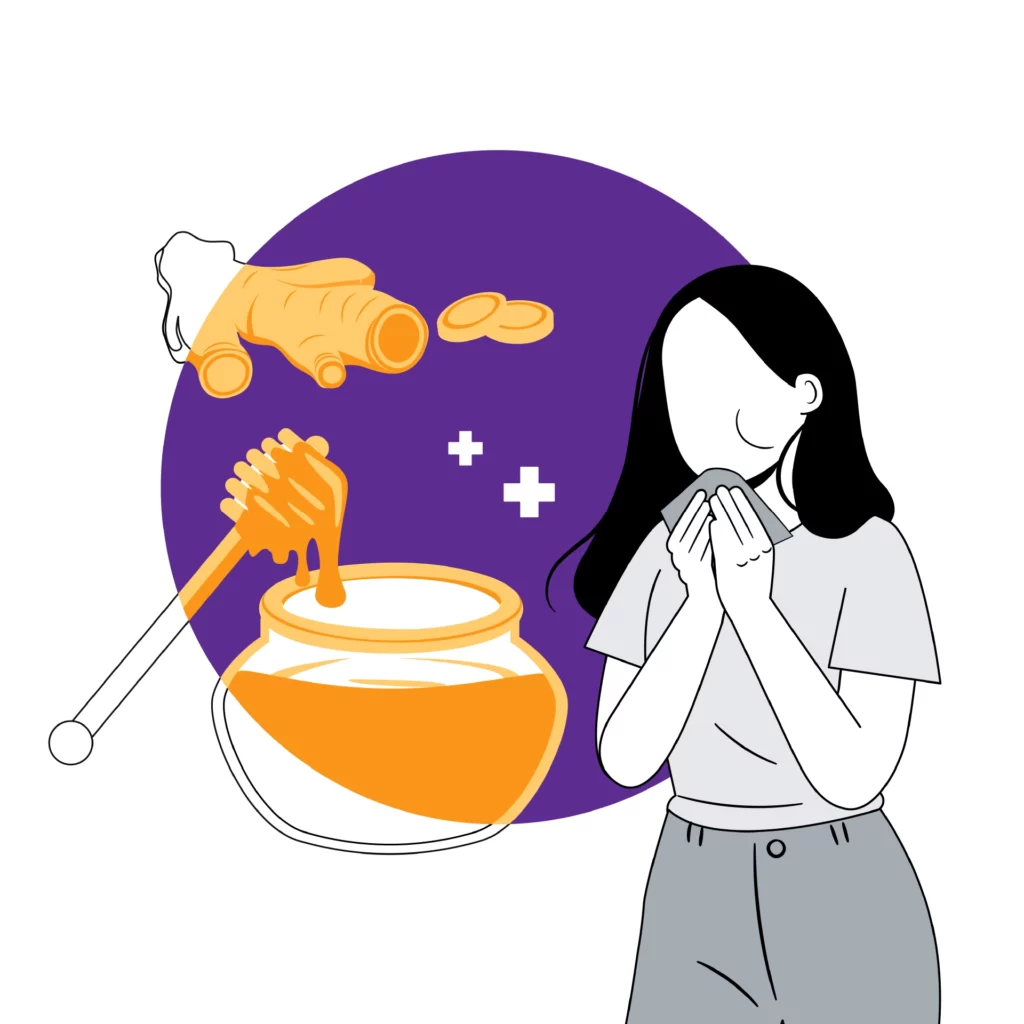Ayurveda | 8 min read
Dry cough: Causes and 15 Home Remedies for Dry Cough
Medically reviewed by
Table of Content
Synopsis
You can have a dry cough for various reasons. Many of them can be treated with the help of home remedies for dry cough. From consuming honey to using an air purifier, there are several things you can try out.
Key Takeaways
- Several conditions, including environmental factors, can lead to a dry cough
- You can try out numerous home remedies for dry cough to provide comfort to your throat
- It's important to consult a doctor if the dry cough persists for a long time
Want to know home remedies for dry cough? Coughing is a reflexive response to eliminate mucus and irritants from your airways. Another name for dry cough is unproductive cough, which is incapable of clearing phlegm, mucus, or irritants from the nasal passages or lungs, unlike productive wet coughs. You could get a dry cough for a variety of reasons.
However, a persistent dry cough may start to interfere with your normal activities. Typically, if a cough persists for longer than eight weeks, doctors would define it as chronic. You can try out various home remedies for dry cough discussed in this blog to get rid of the suffering.
Cause of Dry Cough
After a cold or the flu, dry coughs can remain for weeks. However, they can be treated using home remedies for dry cough.Here is a list of various reasons that may cause you a dry cough:
- Asthma
- Postnasal drip acid re flux
- GERD
- Viral Infection
- Upper respiratory infection
- Allergies
- Covid-19
- Exposure to pollutants such as cigarette smoke
Other causes
- Medications such as ACE inhibitors (used in treating illnesses such as high blood pressure) [1]
- A collapsed lung (occurs when the lung rapidly loses pressure on its own or because of a chest injury)
- Lung cancer
- Heart failure
- Idiopathic pulmonary fibrosis or IPF (a rare illness that causes the tissues in the lungs to stiffen and scar)

15 Home Remedies for Dry Cough That Actually Work
Dry coughs can be quite uncomfortable and can affect both adults and children. You can take some therapeutic medicines to treat them, but there are also numerous instances when home remedies for dry cough can be just as helpful. There is no one-size-fits-all approach to dry cough solutions at home. Before you discover the best home remedy for dry cough for you, you might need to experiment with a few.
Additional Read: Ayurvedic Medicine for Dry CoughHoney
Honey can be utilized to treat dry coughing in adults and children who are one year of age and older. Because of its antimicrobial ability and quality to cover the throat, honey can aid in soothing discomfort. It can be consumed by a spoonful several times per day or mixed with hot tea or water. However, avoid giving honey to kids under the age of 1 year, as it may lead to infant botulism, a rare condition that can happen to infants.
Turmeric
A substance found in turmeric, Cur cumin, can be antiviral, anti-inflammatory, and antibacterial. It is the best remedy for dry cough. Another powerful ingredient, black pepper, enhances the absorption of Cur cumin in the bloodstream.
You can mix 1/8 teaspoon black pepper and one teaspoon turmeric into a drink, such as cold orange juice. It can be brewed into a hot cup of tea too. In addition, turmeric has been used in Ayurvedic Diet food and employed for generations to treat asthma, bronchitis, and upper respiratory illnesses. You can buy turmeric as a pill or as a spice.
Ginger
Ginger, one of the best home remedies for dry cough, has anti-inflammatory and antibacterial effects. Also, it strengthens the immune system and lessens pain and discomfort. You can add ginger to your tea or make it by steeping the chopped or peeled ginger roots and adding them to warm water. It might be even more effective for dry coughs if you add honey to it. You can also consume ginger capsules or munch on the ginger root to get rid of dry cough.
Marshmallow root
Marshmallow root is a kind of herb that is considered one of the best home remedies for dry cough. It is added to cough syrup and lozenges to treat dry coughs. In addition, it works well to soothe the throat and lessen the irritation brought on by a dry cough. Moreover, marshmallow roots have other antibacterial qualities.
Peppermint
Menthol, which is present in peppermint, helps numb throat nerve endings disturbed by coughing. This might ease the pain and lessen the need to cough. Also, peppermint has antiviral and antibacterial properties, which makes it a part of ayurvedic treatment for constipation.
There are various methods for taking peppermint, including savoring peppermint tea or nibbling on lozenges. To help with nighttime coughing, try consuming peppermint tea shortly before bed. Peppermint essential oil also works as one of the home remedies for dry cough, being an aromatherapy treatment.
Masala chai tea
Chai is a beverage that is traditionally used in India to relieve ailments such as sore throat and dry cough. Cloves, cardamom, and cinnamon are the only anti-oxidant-rich components found in masala chai, a natural remedy for dry cough. Cloves might work well as an expectorant too. The anti-inflammatory ingredient cinnamon is also often found in Masala tea.
Additional Read: Benefits of Green TeaCapsaicin
The chill pepper ingredient capsaicin, one of the most significant home remedies for dry cough, reduces persistent coughing. Cayenne pepper spicy sauce and warm water can be used to brew tea in addition to taking capsaicin capsules. To avoid consuming more cayenne hot sauce than you can handle, add drops of it into the water while tasting as you go.
Chili peppers can also be purchased whole and soaked in warm water. However, children are not advised to use capsaicin-based treatments.
Additional Read: Black Pepper Benefits
Aromatherapy with eucalyptus
Using essential oils for healing and calming purposes is known as aromatherapy. For example, eucalyptus essential oil, one of the most trusted home remedies for dry cough at night, can act as a decongestant and help relieve dry cough.
Use an inhaler, spritzer, or diffuser with eucalyptus. You can also add a few drops in hot water and breathe in the steam.
Employ a humidifier
A dry cough may become worse in dry air. Adding moisture to the air via humidifiers can be an effective dry cough treatment at home. As they facilitate sinus opening, humidifiers are helpful for persistent postnasal drip.
If there is dry air in your home, installing a humidifier in your room while you sleep will work as one of the most effective home remedies for dry cough.Utilize an air purifier
With the use of air purifiers, you can get rid of airborne irritants like smoke and dust in your house. They also minimize irritants like pollen and pet dander.
In addition, breathing in fresh air can help decrease throat discomfort and the urge to cough, regardless of whether external contaminants or an underlying condition brings on your cough.
Using salt water to gargle
Warm salt water gargles can help reduce the irritation and discomfort brought on by a dry cough. Add one teaspoon of table salt into a glass of warm water and mix thoroughly. Then gargle numerous times during the day.
Young children shouldn't use these types of home remedies for dry cough since they might ingest the salt water. After brushing your teeth, gargle with salt water to calm the nerve endings in your throat if you wake up with an upset throat from coughing during the night.
Antitussive cough syrup
The way antitussive cough medicines function is by reducing the cough reflex. [2] They are especially helpful for dry coughs since they reduce the urge to cough. Although it is one of the home remedies for dry cough,a prescription is required to buy some antitussives that contain codeine. Others can be purchased over the counter. These frequently include active ingredients like menthol, camphor, or dextromethorphan.
Cough drops
Cough drops are medicinal lozenges that are used to lubricate and relax sore throat tissues. The components and actions of these home remedies for dry cough differ. Menthol, which some cough drops contain, works as a numbing agent to lessen the urge to cough. In addition, cough medicine, including ginger or eucalyptus, is also available.
Liquorice Root
Liquor ice root (Glycyrrhiza glabra) tea has long been recommended for its throat-soothing properties. Since 2100 B.C., liquor ice root has been used to treat coughs, phlegm accumulation, and pain. It is widely available in many grocery and health food retailers.
The dried liquor ice root can be bought online and used to prepare tea by steeping two teaspoons of the sliced root into eight ounces of boiling water for 5 to 10 minutes. However, even though liquor ice root tea is commonly perceived as safe, frequent usage might raise blood pressure significantly and induce menstruation irregularities, exhaustion, headache, erectile dysfunction, and water retention.
Marjoram
Origanum majorana, or Majoram, a kind of oregano, has been used for many years in traditional medicine to treat various ailments. It includes phytochemicals that may lessen cough brought on by pertussis (whooping cough), bronchitis, colds, and asthma.
Steep 3 to 4 tablespoons of dry marjoram in eight ounces of hot water and drink thrice daily. Marjoram is generally regarded as harmless; however, in people who are using anticoagulant (blood-thinning) medications, it may decrease blood clotting and raise the likelihood of bruising and nosebleeds.
Additional Reads: Home Remedies for Chest CongestionLong-lasting dry coughs have a variety of causes. However, there are many home remedies for dry cough. Consult your doctor if the cough worsens or does not go away within two months.
You can get a doctor consultation and visit the experienced doctors on Bajaj Finserv health to know more about dry coughs, their underlying reasons, and home remedies.
References
- https://pubmed.ncbi.nlm.nih.gov/8862965/
- https://pubmed.ncbi.nlm.nih.gov/24490443/
Disclaimer
Please note that this article is solely meant for informational purposes and Bajaj Finserv Health Limited (“BFHL”) does not shoulder any responsibility of the views/advice/information expressed/given by the writer/reviewer/originator. This article should not be considered as a substitute for any medical advice, diagnosis or treatment. Always consult with your trusted physician/qualified healthcare professional to evaluate your medical condition. The above article has been reviewed by a qualified doctor and BFHL is not responsible for any damages for any information or services provided by any third party.




